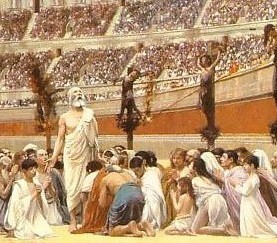In Matthew 13, the mystery of the Kingdom of Heaven was hidden by Christ in parables of daily Hebrew experiences. While His hearers understood what sowing and reaping were, what an expensive pearl or a lost coin or the king of a vineyard was, the deeper meanings He revealed only to His closest companions, the twelve. (Matt. 13:19)
As mundane as they seemed, these were strange parables. These didn't describe the Messianic Kingdom they were awaiting. And for many Christians today, they still don't describe the heaven we are awaiting at the Second Coming. We think of harps and clouds. Jesus describes wheats and tares.
As mundane as they seemed, these were strange parables. These didn't describe the Messianic Kingdom they were awaiting. And for many Christians today, they still don't describe the heaven we are awaiting at the Second Coming. We think of harps and clouds. Jesus describes wheats and tares.
If you follow the words of our Lord carefully through out His earthly ministry, you will begin noticing seemingly mutually exclusive statements about the Kingdom of God. It is now but later. Earthly but heavenly. This Kingdom is a dichotomy so layered as to reveal both the complexity of God and the simplicity of love. Let us take some time to wonder at the thrilling and at the same time perplexing and even confusing contradictions of the Kingdom of Heaven:
- The Kingdom is here, but it is yet to come. Often Jesus told His disciples that the kingdom of Heaven was there at that moment with phrases such as it has “come upon you;" it is “at hand,” “near you” and “in your midst.” Yet Jesus corrected the disciples when they though it was to appear immediately and told them of a story of a king going into a far country to receive a kingdom later. He told us to pray that it comes (future) and even promises that some of his followers, alive at that time, would see it come (soon). The thief asked to be remembered “when you come into your kingdom.” And Jesus responded, “Today” He would be with Him. And Christ promises the Kingdom will finally be delivered into the hands of His Father. The Kingdom is both in our midst now and is still waiting to be revealed. (Matt. 6:10; 10:7; 12:28; 16:28, Luke 10:9; 23:42; 17:21; 19:11-12, I Cor. 15:24)

- It is visible and worldwide and yet it is hidden and you must seek it. Jesus sent out His disciples to preach the gospel of the Kingdom of Heaven to the whole world. He likened it to the tiniest of seeds growing to the most massive of trees. It is like leaven, it grows and yet it is hidden as a pearl or great treasure and we must seek it above all else. (Matt. 6:33; 13:31, 44; 24:14, Mark 15:43, Luke 23:51)
- It was from the beginning and eternal, yet, it was inaugurated at the Cross. (Matt. 25:34, Luke 1:33, Acts. 1:3, 2: 21-28, Rev. 11:15)
- It is an unshakable Kingdom of peace, and yet it is taken by violent force. (Matt. 11: 12, Rom. 14: 17; Heb. 12:28)
- It is brought to us by words, but it is not just words. The gospel of the Kingdom comes to us through hearing. We hear the truth spoken and it is transmitted by words and yet the Kingdom of God does not consist in talk but in power. “So faith comes from hearing, and hearing through the word of Christ.” (Matt. 13:16, 17, Mark 4:15-23, 33; 6:11; 7:14, Luke 6: 27; 8:21; 11:28, John 8: 43, 10:3, Rom. 10: 14, 17; 11: 8, I Cor. 4: 20. Heb. 3:7, 15; 4:7)
- It has authorities, but they are to be servants. They are God's men, yet they can be used by the Devil. God chooses the poor to be rich and the low to be great. The greatest living old covenant preacher, John the Baptist, is below the least in this kingdom. All, in His kingdom, sit on thrones reigning as priests but the leader He put over all the disciples and gave the key to was a poor fisherman. He chooses unworthy men and makes them great, but at the same time, the hierarchy is based on what these men do and teach. So it is God's sovereign choice yet, we too choose by our actions.
- To everyone’s horror His leaders can be hypocrites and even shut up the kingdom so no other men can get in! Yet, His appointed leaders are commissioned to be humble and He warns them that the first shall be last and the last shall be first. Everything is a bit mixed up compared to our democracy and equal rights, for the Kingdom's wages are unfair, for the people are paid the same daily wage no matter when a person started working!
- It is God’s Kingdom, yet the Devil can deceive its citizens. (Matt. 13, 2 Tim. 4:18)
- Though it is not earned by works, you must be baptized to enter. (John 3:3, 5; Acts. 8: 12)
- It is a kingdom of mercy that saves sinners, yet it is a Kingdom of Judgment. (Matt. 13:38, 2 Tim 4:1, Rev. 12:10)
- We are saved by simple faith but the Kingdom has exceedingly high standards for entrance: The beloved Son has given us his Kingdom and delivered us from the dominion of darkness and transferred us to this kingdom with the Father’s good pleasure! With joy He throws out a net to the world and catches all kinds of good and bad fish in His kingdom. Even children are encouraged to enter before they understand what they are doing.
- In fact, you are required to be like a child for entrance. Yet, a great mystery is that flesh and blood cannot inherit it. And all who call on the name of the Lord will be saved, but not all who cry, “Lord” will enter, for only the obedient can get in. And those who look back at their former lives will end up like Lot’s wife. And if you are rich? It’s going to be tougher for you. If you assume you will go in because of some heritage or covenant and are not obedient, the harlots and tax collectors will get in before you. There is quite a list of those who will not be in the Kingdom of Heaven: the cowardly, the unbelieving, the vile, envious, the drunk, one who carouses, the fornicator, impure, idolator, the unrighteous, the immoral. And adulterers, sexual perverts, male prostitutes, those who are effeminate, those with unnatural sexual affections, the greedy, thieves, revilers, murderers, those who take potions to keep from having children (pharmekia), the liars, perjurers, slave traders and robbers! And even as a corporate group the kingdom will be given to the nations who produce the fruits of righteousness. We, His people are sinners and yet we cannot enter the kingdom unless we are perfect. (Matt. 5:20; 7:21;13:47;18:3; 19:14, 23; 21:31, 43; Luke 9:62; 12:32; Acts 2: 21, Gal. 5:21; Eph. 5:5; Col. 1:13; I Cor. 6: 9-10; 15:50, Rev. 21: 8)
- We must sacrifice much to enter, but we are made worthy by His righteousness. Through many tribulations we must enter the kingdom. We must patiently endure sufferings and persecution for our testimony of Jesus. Some even castrate themselves or live in celibacy or pluck out part of the body (metaphorically, corporately); some leave homes or family to become a citizen. We must be faithful with his gifts for He will ask for an account of our talents. But, it is still Christ and His merits that make us worthy. And He promises we will be made worthy and will shine out like the sun. (Matt. 13:43; 18:23; 19:12, Mark 9:47, Luke 18:29; 19: 15, Acts 14:22, I Thess. 2:12, 2 Thess. 1:5)
- Don’t look for signs and yet when you see these things happen... "The kingdom comes not with signs to be observed," He tells the Pharisees then a few chapters later warns His listeners that there will be signs in the sun, moon and stars, fearful times when the powers of heaven will be shaken and when you see these things take place, you know that the Kingdom of God is near. (Luke 17:20; 21:25-32)
We have been taught God's kingdom will be perfect with no sin, so how is it possible that it is also filled with wheats and tares, good and bad fish? It's leaders are holy and sacred but some are corrupt? It is here now and yet to come? If God is coming so all people see, how can it also be hidden? Visible and invisible, spiritual and physical, seen and unseen, simple and complex, plain and mysterious?
There is only one entity that can be all these things at once. And that is God's Bride--His ekklesia, His Church. (Matt. 22:2 and chap. 25, John 3:29)
The Kingdom of God is the Church, Christ's Bride. He was betrothed to her when He was among us, when He instituted the ekklesia (Matt. 16). He is going to prepare a place for her and will come again and receive her unto Himself. The Church is being made holy and pure, being washed by baptism and His word. (Eph. 5: 26, 2 Cor. 11: 2, Rev. 19: 7). She is both on earth (The Church Militant) and in heaven (Church Triumphant) and so when He comes for the Wedding Feast, He is bringing the holy, shining, adorned capital city of His heavenly Kingdom to His Kingdom on earth. (Rev. 21:2)
She is the great mystery and enigma with her rites and sacraments, with her struggling to be holy and with her 2000-year-old faith in her Betrothed. She is the seen in the outstretched arms of St. Peter's Square, her cathedrals and popes and charities and schools, yet, she is the unseen in her humble, quiet cloistered prayers and in the daily spiritual wars going on in her people's hearts.
The Church, who the world loves to hate is Christ's beloved Bride, the wife of the Lamb who is presently imperfect, yet covered with His perfection as she is being made in her husband's image. (Rev. 21:9)
The Groom and His Bride finish out the story of God's love for mankind together, united forever in eternal love as they both, arm in arm, invite you to the wedding feast, "Come" they say, "Come. Let him who is thirsty come, let him who desires, take the water of life without price." (Rev. 22: 17)
That is how the mysterious story ends… how the seeming contradictions are fulfilled. "It is finished" …. Christ and His bride live happily ever after.















/images/scan0005.jpg)


